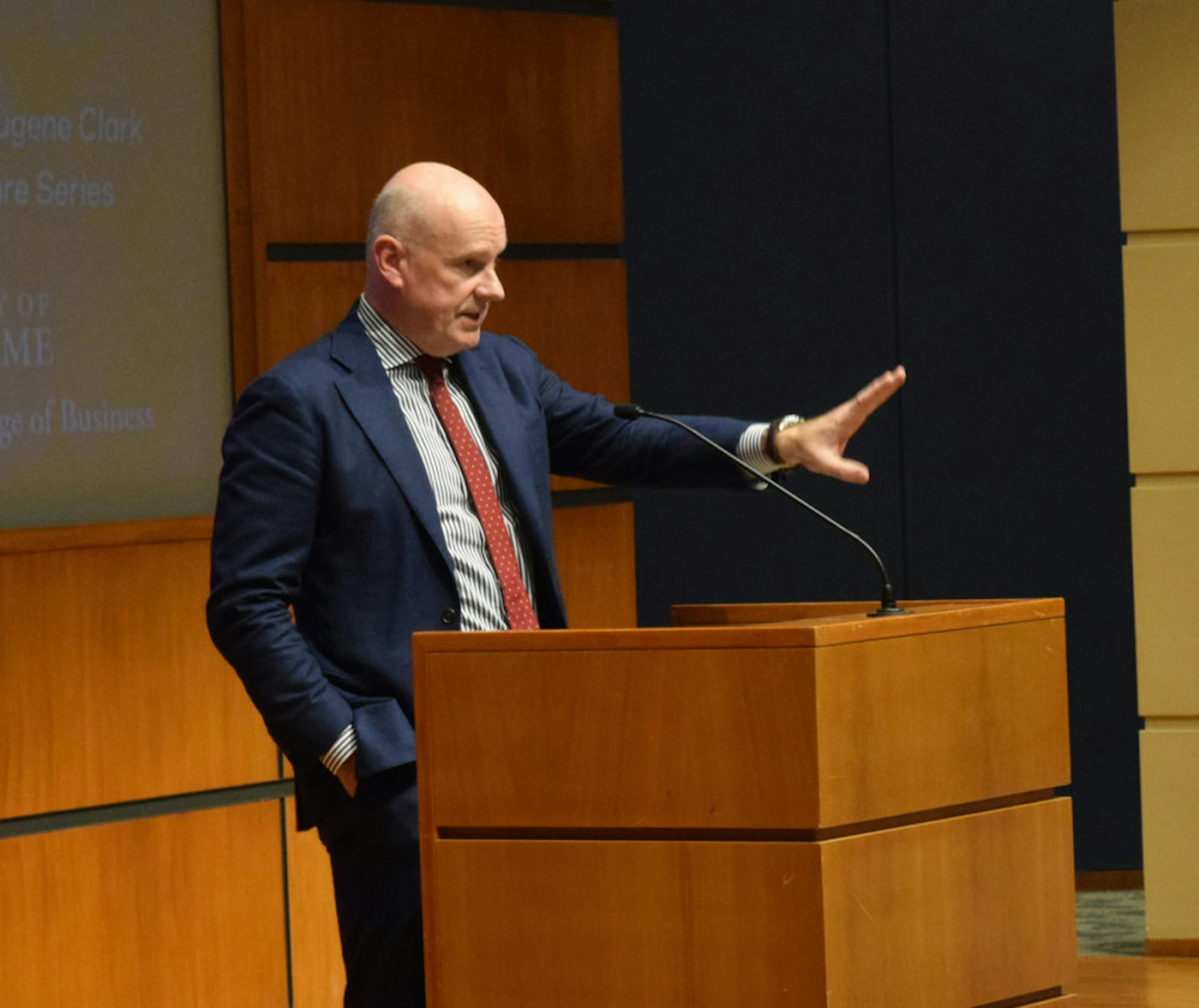While the polarizing rhetoric of the 2016 presidential election is seen as unique to certain American candidates, Gerard Baker, editor-in-chief of the Wall Street Journal, said this rhetoric is not limited to America but rather mirrors a growing international rhetoric of extremist views. Baker spoke on the similarities between current American and European views in a lecture Monday night titled “2016 Presidential Election: A Global Perspective.”
The lecture, which was held through the Eugene Clark Distinguished Lecture Series and the Mendoza College of Business, was held in Mendoza’s Jordan Auditorium.
Baker said he has covered more than six presidential elections in his career and noted this year’s is different.
“I cannot recall a more extraordinary election then the one we are having now,” he said. “However, it’s not just happening here — we are seeing extraordinary events elsewhere in the world, and they have remarkable things in common.”
Parties espousing extreme views are gaining popularity in established Western democracies, primarily because of economic dissatisfaction, Baker said. In recent elections in Germany, the far-right party Alternative für Deutschland, which was created only three years ago, secured 25 percent of the vote in some states, Baker said.
Baker said the Wall Street Journal’s polls have demonstrated American dissatisfaction with the direction of the country.
“Other than during the first three months of President Obama’s administration, for the last 10 years, Americans have continually reported that they feel the country is on the wrong track,” Baker said. “People feel more strongly now than they did four or eight years ago, but these numbers suggest dissatisfaction with the economy is higher now than it was during the recession, or in 2012 when Obama was re-elected.”
The stagnation of middle class income has contributed to the sense of dissatisfaction, Baker said.
“The U.S. has been the most successful economic machine in the history the world. It has been particularly successful in growing the middle class,” Baker said. “What we’ve seen in the last 25 years is that the progress has actually stopped.”
While the United States is unique in when dealing with middle-class income stagnation, Baker said, economic dissatisfaction is also seen in Europe’s high unemployment rate.
“In the last 25 years we have seen trade agreements, we have seen [an] opening up and increase of the global economy, we saw the collapse of the Soviet Union in 1991 and the emergence of China as a major player at the end of the 1980s and the beginning of the 1990s," he said. “This unleashed huge amounts of resources into the world economy, that had not been available before. A combination of free trade agreements and the emergence of these economies into the global system created an extraordinary amount of supply that drove down the price of labor. You saw this situation where people in high-wage countries were significantly impaired by the arrival of the low-cost countries on the global scale.”
This opening of the global economy combined with technological advancements has created job insecurity for millions of low-wage workers in the United States and Europe, Baker said.
“Advances of technology and waves of innovation have been a feature of the capitalist system that encourages investment and innovation. What it is doing is creating an enormous sense of insecurity for many workers — robots replacing workers and computers replacing workers,” he said.
Economic dissatisfaction has created “an overwhelming desire” to recover national identity, Baker said.
“Combined with the sense of political correctness that you see in Washington and Brussels, there is pervasive political correctness that has alienated numerous people around the world,” he said.
Baker said whichever candidate wins in the presidential election will have a hard time passing international trade agreements, even if the agreement is beneficial for the global economy. He said both Democrats and Republicans will not push for global trade initiatives and instead opt to support more protectionist measures, as many believe the opening of the global economy has contributed to the stagnation of the middle class.
“I don’t want to give the impression that we are retreating into the 1920s, 1930s [economy] because people are too dependent on each other, globally,” he said. “But I do think we are headed into a period where we can see a much greater assertion of national rights.”
WSJ editor-in-chief gives global perspective on presidential election
Gerard Baker speaks in the Jordan Auditorium of the Mendoza College of Business on Monday night. Baker, editor-in-chief of the Wall Street Journal, spoke on the rhetoric of the 2016 presidential election.









